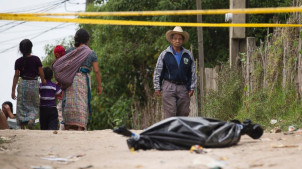
On the night starting on the 19th of September 2014, at least 15 armed employees of the company Cementos Progreso fired on people from the El Pajoques community in San Juan de Sacatepéquez, Guatemala. They were peacefully resisting the destruction of their environment by a cement plant. At least 8 people are dead, 4 injured and several families were displaced in the violence. Although the National Civil Police (PNC) was alerted, the officers did not come until the morning of the 20th. By September 22 the state of prevention (first grade state of emergency) was declared throughout the municipality, with a military presence and the PNC present in 4 villages.
There are 12 communities that resist and defend the territory of San Juan Sacatepequez, to prevent the commissioning of Cement by Cementos Progreso (CEMPRO). The resistance is occurring since 2006, when the project was announced. Construction began in 2013, together with a new highway called the “Regional Ring”.Of the around 9000 people that were able to express their view on the project, 99.95% expressed their opposition to the construction of the cement factory. More information on this case is in the Atlas of Environmental Justice.
The Global Alliance for Incinerator Alternatives (GAIA) strongly condemns the recent deaths.Tthere is also fear that violence will continue under the recently-declared State of Emergency. More than thirty leaders who are organizing to defend their land from pollution are now facing arrest warrants. They have been charged with crimes despite the fact that no real investigation into the incident has been carried out.
The member organizations of the Global Alliance for Incinerator Alternatives, GAIA, express their solidarity with the communities that are facing health and environmental risks associated with the proposed cement kiln. Three GAIA members held a public meeting with representatives of 12 local communities that would be affected by the proposed plant to offer technical support and information. The meeting took place on September 19
Mr. Carlos Arribas Ugarte of the Spanish organization Ecologists in Action, one of the GAIA members who was at the meeting, has stated that the cement kiln, which aims to be the largest in Central America, “could burn large volumes of hazardous waste as fuel, and it’s completely logical for communities to oppose it.”
Dr. Raul Montenegro, professor at the National University of Córdoba in Argentina and winner of the Right Livelihood Award (Alternative Nobel Prize)—another GAIA expert who was at the meeting — has stated that what happened “will be reported to the Human Rights Commission of the UN” and that in the coming days “international condemnation will multiply to stop the construction of this cement kiln, which has the communities under siege.”
More info:

The project ENVJUSTICE has received funding from the European Research Council (ERC) under the European Union’s Horizon 2020 research and innovation programme (grant agreement No. 695446)